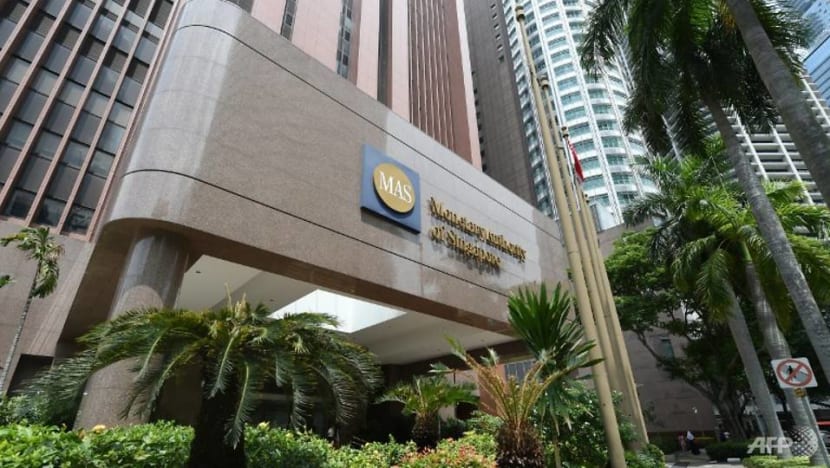Financial advisers must improve the way they identify vulnerable customers, roadshow sales conduct: MAS

The Monetary Authority of Singapore (MAS) building in Singapore. (Photo: AFP/Roslan Rahman)
SINGAPORE: While most product recommendations by financial advisers met the needs of their customers, improvements can be made when it comes to identifying vulnerable customers and the closing of such sales at roadshows, said the Monetary Authority of Singapore (MAS) on Tuesday (Jun 22).
For instance, sales done at roadshows had “higher incidences of unsuitable recommendations or inappropriate influence” through the use of gifts or incentives, the regulator said as it released the findings of its latest mystery shopping exercise for financial advisers.
A majority of these financial advisers also failed to properly identify vulnerable customers. This group of customers is defined as those who meet any of the two following criteria – aged 62 years or older, not proficient in spoken or written English, has certifications below GCE ‘O’ level or ‘N’ level or equivalent.
While this did not eventually affect the suitability of products recommended, MAS said it “takes a firm view” that vulnerable customers should nonetheless be identified to accord them additional safeguards.
The mystery shopping exercise, the third of such exercises conducted by the MAS, covered 500 representatives from 12 insurers and licensed financial advisers from mid-2018 to end-2019. The mystery shoppers were members of the public who had posed as customers interested in seeking financial advice.
READ: MAS reprimands 4 financial institutions, 2 people for breaching risk management, remuneration rules
AREAS OF IMPROVEMENTS
In its media release, MAS said slightly more than half of the mystery shopping cases conducted at roadshows had “some deficiencies”.
About 35 per cent of financial adviser representatives tried to influence purchase decisions by offering gifts or incentives at roadshows, more so than sales done through referrals (11 per cent).
There were also more unsuitable products being recommended at roadshows (15 per cent), compared to customer referrals (7 per cent).
MAS also observed “lapses” in the sale and advisory process involving vulnerable customers.
For instance, the representatives did not properly identify those considered vulnerable in nearly three-quarter of the mystery shopping cases.
In instances where such customers were correctly identified, 75 per cent of financial advisers did not advise the shopper to involve a trusted individual, such as a relative or friend, in the sale and advisory process.
When making product disclosures to this group of customers, 76 per cent did not adequately explain the features, risks, and fees and charges of the products being recommended. For instance, some did not disclose the free-look period where customers may reconsider their purchase decisions and exercise their right to cancel the transaction.
Also in cases where vulnerable customers were correctly identified, 33 per cent of the representatives’ supervisors did not conduct a call-back during the free-look period to confirm that customers have understood their purchases.
READ: MAS bans former insurance broker representative for dishonest conduct
MAS said it has required the 12 financial advisory firms to address the deficiencies uncovered.
It will also review its rules to improve the conduct of financial advisers at roadshows and consult on proposals to enhance safeguards for vulnerable consumers.
Meanwhile, the regulator said it will review fact-finding requirements to allow financial advisers greater flexibility in collecting information that better tailors to the needs and profiles of their customers.
Its latest exercise had shown while fact-finding conducted was generally not as comprehensive as required by MAS’ rules, “there was sufficient financial information obtained to make suitable product recommendations in most cases”.
While obtaining a full set of a customer’s financial information is important for holistic financial planning, it “may not be necessary” in the case of simple or low-cost products, it added.
MOST RECOMMENDATIONS WERE SUITABLE: MAS
That said, the percentage of suitable product recommendations improved to 88 per cent, from 70 per cent in the last mystery shopping exercise done by the regulator in 2011.
“Most FA (financial adviser) representatives helped shoppers make accurate and complete disclosures of their medical conditions. The investment returns illustrated in the insurance policies were properly explained by most FA representatives,” the MAS said in its media release.
It added that financial advisory firms that generally fared better in the mystery shopping exercise were those that had their board and senior management placing emphasis on fair dealing outcomes and put in place robust policies and controls.
In particular, one firm stood out as having a robust sales and advisory process that translated into 100 per cent suitable product recommendations, the regulator said, without naming the firm.
“This firm has invested heavily over the years in instilling high ethical and conduct standards among its representatives, with strong tone from the top to put customers’ interests first,” it added.
On the other hand, customers also have important roles to play by reviewing sales documents to ensure accurate representation of their financial profiles and needs, the regulator said.
It also encouraged members of the public to refer to MoneySense, the national financial education programme, for more information on what to look out for when seeking financial advice.
MAS’ assistant managing director for capital markets Lim Tuang Lee said the regulator will work with the financial advisory firms to “continually raise standards of conduct and embed a culture of fair dealing” in the industry.
“High standards of practice require systematic and focused attention by board and senior management of FA firms to ensure that FA representatives put customers’ interests as top priority,” he added, noting that this includes the proper onboarding and training of these representatives, as well as putting in place appropriate incentive and remuneration policies and robust disciplinary frameworks.
The release of the findings comes a week after the regulator reprimanded major insurers for breaching rules related to risk management practices and sales-related remuneration under the Financial Advisers Act.
The four financial institutions were AIA Financial Advisers, Prudential Assurance Company Singapore, Aviva and Aviva Financial Advisers.












